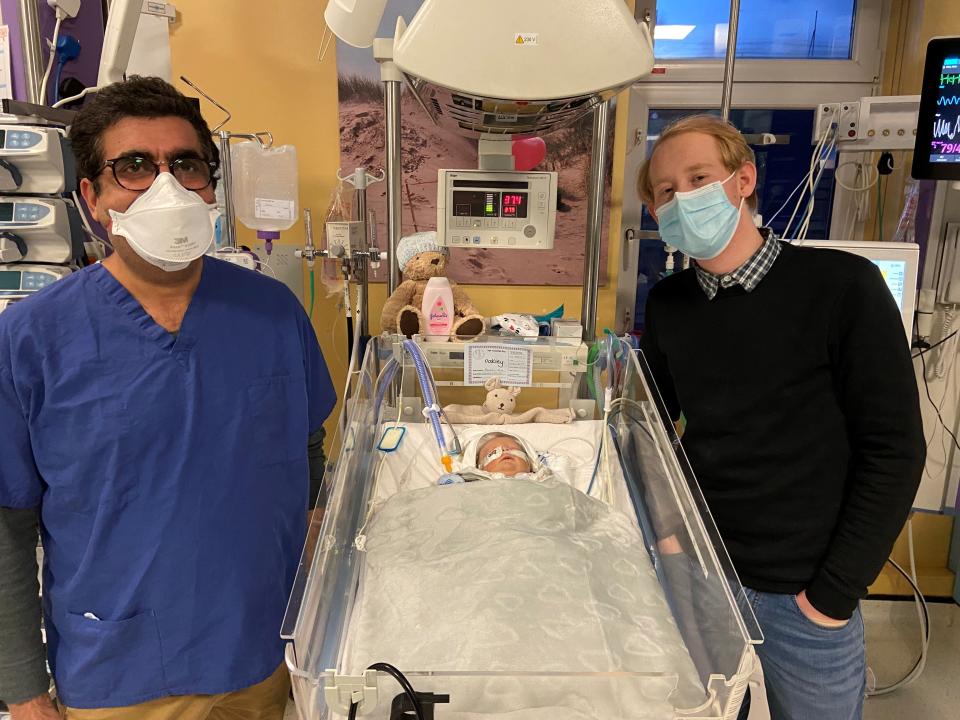Parents hail ‘amazing’ care for baby flown 120 miles to London hospital by Coastguard for life-saving treatment

Dr Akash Deep with baby Oakley Miles-Slade and father Lewis Slade
(Handout)The family of a baby who was flown 120 miles to a London hospital by the Coastguard for life-saving treatment have praised the “absolutely brilliant” care he received.
Oakley Miles-Slade was born at Norfolk and Norwich Hospital at the end of January but became critically ill due to a liver abnormality that caused his heart to fail.
Doctors arranged for him to be transferred to King’s College hospital five days after birth, only to find that the region’s air ambulance was out of service. The Coastguard stepped in and flew to the helipad on top of the hospital, in Denmark Hill.
After successful treatment, Oakley was able to leave King’s at the start of March to return to the Norwich hospital, and has been home for three weeks.
His mother Lauren said today: “I thought it was amazing what they did for him and how they got him there.
“He is still on medication but is doing a lot better. I thought his care was absolutely brilliant. They were all amazing staff. They worked tirelessly and effortlessly to make sure he was okay.
“He was so critically ill they didn’t know if he would make the journey.”
Oakley had a benign diffuse liver tumour. This caused an abnormally high blood flow from the main artery to the abdomen, bringing blood straight back to the heart and preventing it from reaching the lower body.
Doctors carried out a “coil embolization” procedure that reduced the size of the “abnormal connection” and enabled the blood supply to the lower limbs, kidneys, bowel and heart to return to normal.
Dr Akash Deep, clinical lead for paediatric intensive care at King’s, said its paediatric liver centre is a national hub and “the largest service of its type in the world so we knew we had the expertise to care for baby Oakley”.
Rob Bentley, a trauma surgeon at King’s who led the introduction of London’s only 24/7 helipad in 2016, said:
“We have carried out practice landings with the Coastguard so we knew the helipad could accommodate the aircraft. King’s had the perfect mix of clinical expertise and the physical infrastructure to enable the transfer to take place.”
Oakley’s father Lewis Slade said: “It has been very difficult to see our new baby so unwell but you just have to trust in the professionals. It’s amazing how they all worked together to get Oakley the care he needed.
“Since being treated at King’s, Oakley’s kidney function has returned to normal, meaning he has not required dialysis, and he has been brought off the ventilator and is now breathing for himself. We’d like to thank everyone involved in helping our son.”
The transfer was organised by Children’s Acute Transport Service (CATS), which is based at Great Ormond Street Hospital.
Every year it transfers 1,200 sick babies and children from 50 hospitals in the North Thames and East Anglia regions to specialist hospitals in London and Cambridge.
Dr Thomas Bycroft, consultant in paediatric intensive care, said: "I was incredibly proud to be part of the CATS team on call that night, which helped get Oakley the urgent care he needed from the team at King’s.
“Bringing the skills of specialised nurses and intensive care doctors on the road - by land or air - and to the bedside of critically ill children can make all the difference in situations like this.”
Read More
Teen girl blasted in the chest with shotgun in broad daylight attack
London Air Ambulance builds app to save crews crucial time on missions

 Yahoo Finance
Yahoo Finance 